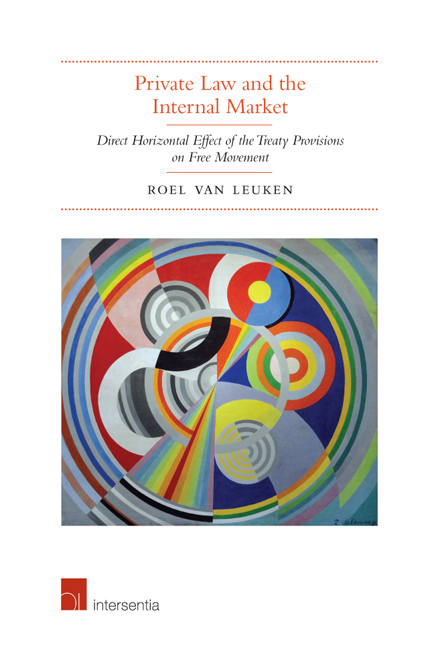 Private Law and the Internal Market
Private Law and the Internal Market Book contents
- Frontmatter
- Preface
- Contents
- Table of Cases
- List of Abbreviations
- Chapter 1 Introduction
- Part I Direct Horizontal Effect: Concept and Application in Competition Law
- Part II Direct Horizontal Effect: Internal Market
- Chapter 4 Fundamental Freedoms: Content of the Prohibitions
- Chapter 5 Case Law on Direct Horizontal Effect of Articles 45, 49 and 56 TFEU
- Chapter 6 Case Law on Direct Horizontal Effect of Articles 34 and 35 TFEU
- Chapter 7 Case Law on Direct Horizontal Effect of Article 63 TFEU
- Part III Justifications
- Bibliography
- Index
Chapter 6 - Case Law on Direct Horizontal Effect of Articles 34 and 35 TFEU
from Part II - Direct Horizontal Effect: Internal Market
Published online by Cambridge University Press: 27 September 2018
- Frontmatter
- Preface
- Contents
- Table of Cases
- List of Abbreviations
- Chapter 1 Introduction
- Part I Direct Horizontal Effect: Concept and Application in Competition Law
- Part II Direct Horizontal Effect: Internal Market
- Chapter 4 Fundamental Freedoms: Content of the Prohibitions
- Chapter 5 Case Law on Direct Horizontal Effect of Articles 45, 49 and 56 TFEU
- Chapter 6 Case Law on Direct Horizontal Effect of Articles 34 and 35 TFEU
- Chapter 7 Case Law on Direct Horizontal Effect of Article 63 TFEU
- Part III Justifications
- Bibliography
- Index
Summary
INTRODUCTION
Chapter 4 has made clear that acts of Member States can be reviewed directly against the Treaty provisions on the free movement of goods, which have direct vertical effect. This chapter examines whether Articles 34 and 35 TFEU also apply, or will at some stage apply, directly to acts of individuals. Section 6.2. will analyse the judgments of the Court of Justice in which it addressed the issue of their direct horizontal effect. The results of the analysis are summarised in section 6.3. and supplemented by observations on the expected evolution of the Court's case law.
CASE LAW: CHRONOLOGICAL OVERVIEW
This section will identify and discuss the judgments in which the Court of Justice expressed or is said to have expressed a view on the issue whether the Treaty provisions on free movement of goods have direct horizontal effect.
CASE LAW REGARDING INTELLECTUAL PROPERTY RIGHTS
Intellectual property rights can frustrate the free movement of goods. The Deutsche Grammophon judgment is a striking example. 1 In its home market, a German gramophone record producer (DG) exclusively supplied retailers and wholesalers that had committed to observe the consumer prices set by DG. Metro – a German wholesaler – circumvented this obligation by obtaining supplies via the French company Polydor (a DG subsidiary). DG filed an application for an injunction prohibiting the importation, invoking an exclusive right to distribute the protected goods that was recognised by law (Verbreitungsrecht ; a right related to copyright). The national court hearing the application allowed the claim. On appeal, the question arose whether the national legislation which allowed DG to invoke its intellectual property rights was compatible with Article 34 TFEU. The Court of Justice brought clarity:
11 Amongst the prohibitions or restrictions on the free movement of goods which it concedes Article 36 refers to industrial and commercial property.
On the assumption that those provisions may be relevant to a right related to copyright, it is nevertheless clear from that Article that, although the Treaty does not affect the existence of rights recognized by the legislation of a Member State with regard to industrial and commercial property, the exercise of such rights may nevertheless fall within the prohibitions laid down by the Treaty.
- Type
- Chapter
- Information
- Private Law and the Internal MarketDirect Horizontal Effect of the Treaty Provisions on Free Movement, pp. 115 - 132Publisher: IntersentiaPrint publication year: 2017


